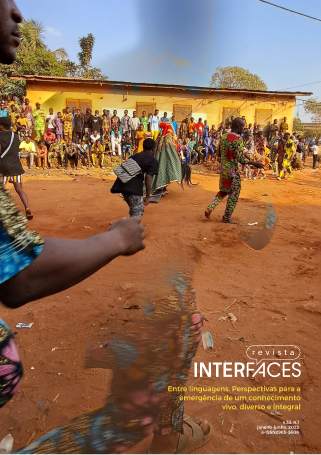A arte de viver nas ruínas da pele: sobre um fantástico feminismo especulativo
The arts of living in ruins: on fantastic speculative feminism
DOI:
https://doi.org/10.60001/ricla.v33.n1.8Resumo
Este texto tem o objetivo de ser um ensaio de aproximação com o trabalho de três jovens representantes latinas da literatura fantástica, Mariana Enriquez, Guadalupe Nettel e Maria Fernanda Ampuero, através das lentes de Donna Haraway (2023) na obra Ficar com o problema: Fazer parentes no Chthluceno. A partir de um dos pilares do texto, o acrônimo SF, por vezes traduzido como feminismo especulativo (speculative feminism), propõe-se argumentar a literatura ficcional feminista como uma estratégia de viver-com o problema do peso da violência da modernidade-colonialidade sobre a América Latina e seus atravessamentos com a questão de gênero. Nas fronteiras entre cultura e natureza, nas ruínas do império da razão do Ocidente, os contos trazidos se encontram na formulação de distopias animalistas, em que mulheres e bichos se unem no devir da descolonização dos seus corpos marginalizados. Ao mesmo tempo, as teorias literárias sobre os campos do insólito, do fantástico e do realismo mágico são primordiais para entender a construção das narrativas apresentadas.
Palavras-chave: Feminismo especulativo. Literatura fantástica. Animalismo. Arte latina.
Abstract
This present article aims to approach the work of three latin american representatives of fantastic literature, Mariana Enriquez, Guadalupe Nettel and Maria Fernanda Ampuero, through the lens of Donna Haraway (2023) in the work Staying with the trouble: making kin with the Chthlucene. Based on one of the pillars of the text, the acronym SF, sometimes translated as speculative feminist, it is proposed to argue feminist fictional literature as a strategy of living-with the problems and violences of modernity-coloniality on Latin America and its implications for gender relations as well. On the frontiers between culture and nature, in the ruins of the western empire of reason, the tales brought are found in the formulation of animalistic dystopias, where women and nature unite in the future of decolonizing their marginalized bodies.
At the same time, literary theories on the fields of the fantastic and magical realism are essential to understand the construction of the presented narratives.
Keywords: Speculative feminism. Fantastic literature. Animalism. Latin American art.
Downloads
Downloads
Publicado
Edição
Seção
Licença

Este trabalho está licenciado sob uma licença Creative Commons Attribution 4.0 International License. O envio dos trabalhos implica a cessão sem ônus dos direitos de publicação, inclusive em versão eletrônica online. Todos os diretos provenientes da venda da revista ficam cedidos à Revista InterFACES. A republicação dos trabalhos deve mencionar a publicação original em Revista InterFACES.


